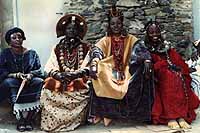| Djibril's Last Interview | African Film Links |
|
Interview with Djibril
Diop Mambety
INTERVIEWER: Just tell me your name and your occupation and how you'd like to be described. DJIBRIL: My name is Djibril. My first name is Djibril. Djibril is Gabriel, like the angel. If I have to describe myself I can say that I am just a history of a dream.
DJIBRIL: All my life is a dream. All my friends too.
DJIBRIL: Kind of. INTERVIEWER: Hyenas has been very popular here. I understand that at the opening of the Festival you stood up and said that it is about the World Bank. Tell me about that. DJIBRIL: Its earned millions many millions. It takes place in a poor city, amongst poor people and what I'm saying is : if you want money one of you will have to be killed. The World Bank and it's International Monetary Fund did the same......with the poor South of the world. They tell the African people "we know that you're poor but you have too many peoples working and you don't have enough money to pay them so you have to kill some of them. Then we can give you money. You have to clean up your economy. kill enough people and we will give you money."
DJIBRIL: Yes, it's mathematics. Kill and the money will be here
DJIBRIL: You know in the beginning I kill them. You have elephants going away with the wind. They are the time. They are the life going on, and between the elephants at the beginning and the elephants at the end, you have the kingdom of Hyenas. Hyenas are not the time, elephants are the time and during that time Hyenas like you and I will try to survive. You know the Hyena is a terrible animal. He is able to follow a lion, a sick lion during all seasons. And during the lion's last days it comes down and jumps on him and eats him, eats the lion peacefully. That is the life of the World Bank. They know we are sick and poor and we have some dignity. But they can wait, wait for the last days when you say OK, I know my dignity is meat. I want to survive. Please take my dignity and kill me with your money.
DJIBRIL: You know the world bank is just a picture. If the west leaves Africans alone, their money and the profit will stay the same strong force. But you know Africans are also like the world bank. Hyenas, please, hyenas. It's the money. They're the same slaves to money and that's perhaps a heritage from the west.
DJIBRIL: There is some kind of hope. Hyenas are frightened and elephants follow the wind. They follow the wind and follow the life.
DJIBRIL: My last hope is that my children become elephants away from Hyenas. For me a film should be a bomb, a bomb of emotion like a rush -not a joy for forgetting reality, but a joy for opening your sweet dream for the reality.
DJIBRIL: I can't say. (pause). Three are professionals. No more. You know why? Myself, I am actor. I came from the theatre to the cinema. I never learnt cinema in any schools. That's why I like working with non-professionals. The difference between professionals and non- professionals is a professional learns about his character in order to play it, but a non-professional plays with his own person, his own soul, his present soul and tries to make do with it. That's why they are more truthful to their material. They are nearer life than a professional.
DJIBRIL: I Just asked them who they wanted to play or which character they wanted to be. Most of them knew their characters because all these people in the story came from bars, from townships, like the one in the film. They live with Hyenas, and I am sure that in the darkness of the world, they also dream of being elephants.
DJIBRIL: African film makers I am sure are able to reinvent the cinema. Cinema is a young invention we are now in the year 1993 and the cinema will have it's first centenary in '95. It's still a very young invention. Africa can rediscover that moment of the invention of cinema. Birds know what god is like. They are nearer than Hyenas to god. They are like some kind of elephant whose wings flow in the wind, and African Film makers can be birds for reinventing the seventh art. We are perhaps poor in money but so rich by situation and hope.
DJIBRIL: Birds are the next step. Let's follow birds - birds are our dreams - and reinvent cinema
DJIBRIL: Cinema can reach more people than theatre. I prefer theatre to making films, but I lost my own theatre many years ago. In 68 I left the national theatre to make my first film "Contrast City" in 1969. From that time I haven't made many films. I must just wait for when the dream is ready to take off. I waited for that moment, my life's dream, your dream.
DJIBRIL: Theatre is theatre. Film is film. As I said, film is a very young invention and I have to follow how others are making films. I am free with pictures. Every time I make a film I want to reinvent film. When I make films I want to make sure that there exists this sense of reinvention and this is very difficult to do. I prefer walking like an elephant rather than making films like a Hyena.
DJIBRIL: You know I don't often go to the cinema. Personally, I prefer films in the eyes of younger filmmakers - for myself it's better than going to see films. Djibril Diop Mambety's Films are
available from |
| African Film Links |


